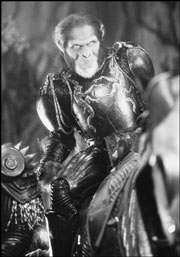PLANET OF THE APES
directed by Tim Burton with Mark Wahlberg, Tim Roth, and Helena Bonham Carter opens July 27 at Cinerama, Majestic Bay, Metro, Pacific Place, and others
THE YEAR 2029 isn’t all that it’s cracked up to be for eager U.S.A.F. captain Leo Davidson. First he loses his seat on an exploratory space mission to one of several genetically engineered superchimps on board his huge mother ship. Then, as we know, the future will test him soon enough in this sequel to 1968’s original Planet of the Apes. Following a convenient space-time storm and tropical crash landing (didn’t we just see that in Jurassic Park III?), a confused Leo is swiftly rounded up with a bunch of other mangy humans. That much is borrowed from the first Charlton Heston picture, only here the humans can talk, and we’re emphatically told it’s not Earth—so don’t go expecting Mark Wahlberg to pound the sand beneath the Statue of Liberty. (Don’t anticipate any Hestonian overacting from the Vanity Fair cover boy either; his big speech is a poorly written afterthought, and the guy never even removes his shirt.)
Instead, as Leo is transported to the ape capital, Batman director Tim Burton immediately stamps the place with his dark, distinctive visual style. (All the urban scenes take place at night.) It’s a combination of Dr. Seuss, Mont-Saint-Michel, and a Mayan ruin, overgrown with vines its rulers use for convenient swinging and scaling. The apes live in an early medieval period mired in superstition and hatred of the “damn dirty human” (one of several lines amusingly paraphrased from the original). Such ignorance and intolerance aren’t shared by enlightened Ari (Helena Bonham Carter), who suggests Kim Hunter’s 1968 Zira.
Yet Ari is also a different character, flirtatious and almost freakishly sexy, even when she’s hanging upside down from a rafter. Rick Baker’s remarkable ape masks allow Bonham Carter and other cast members amazing expressiveness, although everyone in fur has been coaxed to far more simian behavior than in the original. (This new Planet boasts more sniffing than any movie since Benji.) The troops led by fascist General Thade (Tim Roth) scamper about menacingly on all fours; humans are clearly no match for their strength and jumping ability. Even if the apes lag behind technologically, it seems they’ve invented the mini-tramp.
AS IN 1968, the inevitable subtext to Planet is racism, in which sense Burton’s writers don’t really advance the movie too far from its origins. The context has changed, however, since American cities aren’t burning with race riots, and the Cold War-Vietnam War overtones are also missing. These apes are living in a kind of crumbling imperial Rome, with snarling, tantrum-prone Thade aiming to impose martial law. Leo becomes a dangerous infidel and rebel to the empire—and a reluctant messiah to his own oppressed, multiethnic people, whom he tells will be liberated by the return of his mother ship. A fighter, yet no brute, Leo recalls Gladiator‘s Maximus, and Planet‘s legion of CGI soldiers marching to crush the rebellion will strike many as familiar—along with the rest of the script.
Even as Planet manages to score one (supposed) surprise and include one (expected) cameo, it suffers from this summer’s same Jurassic bug of stale sequelitis. Remember—there were four follow-ups to the original, then a TV show (let’s not start with the lunch boxes). We’ve heard the paeans to tolerance before and the same indictments of mankind. “No creature is as devious and as violent,” we’re told, but Planet unfortunately lacks both those qualities. Chases, escapes, more chases, then a final desert showdown—it makes the original seem a sci-fi classic by comparison.
Of course, that film was made for baby boomers who wanted to fight the establishment, fight racism, even fight Hollywood. Now they’re grown up and the parents of a much larger Gen-Y audience that just wants to see a big fight (which Burton duly, if unimaginatively, delivers). The PG-13 Planet is an acceptably entertaining kids’ movie, and those kids are probably less racially conflicted than any generation in history, a credit to the climate that also produced the ’68 original. Today, as a result, Planet will probably be a big hit—unless those kids start showing some discrimination at the box office.








